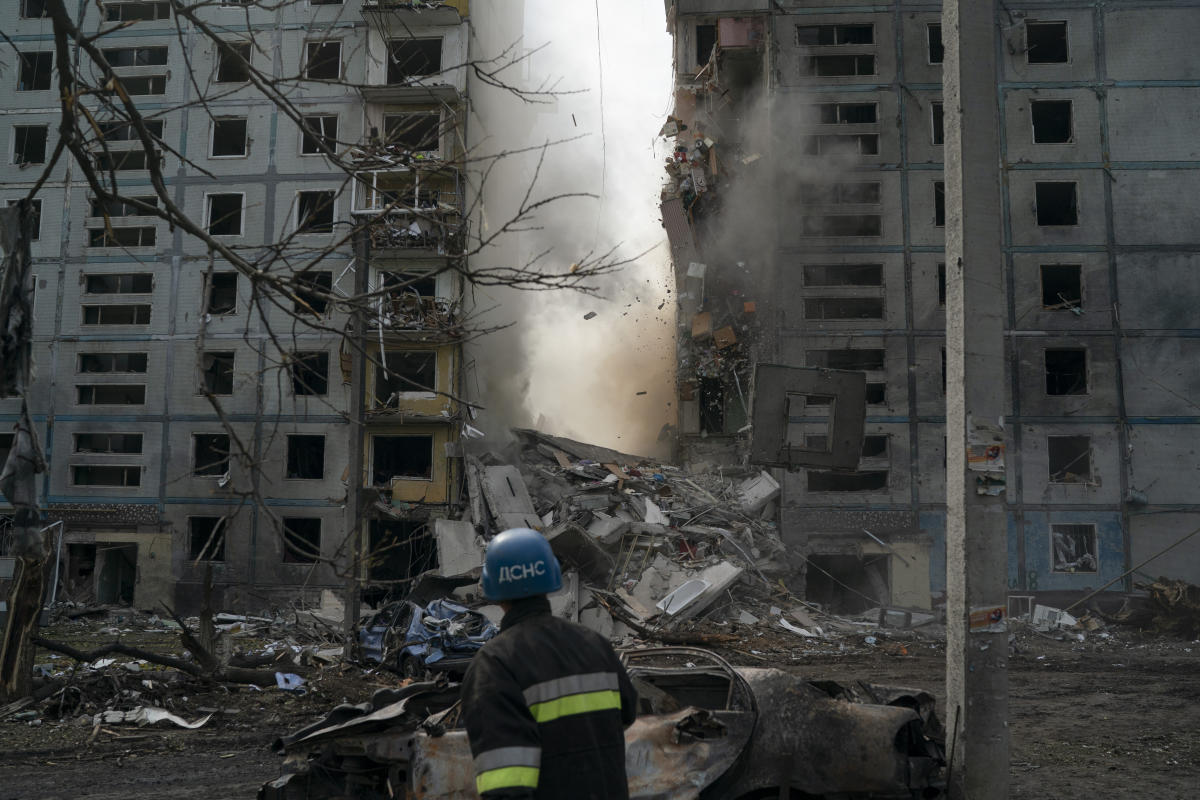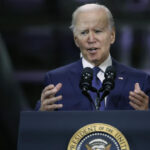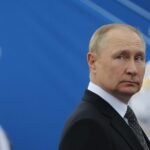
KYIV, Ukraine (AP) — Russian forces strafed Ukraine with a fresh barrage of missiles and munition-carrying drones Tuesday, a day after widespread strikes killed at least 19 people in what the U.N. human rights office described as a “particularly shocking” attack that could amount to war crimes.
Air raid warnings extended throughout the country in the morning, sending some residents back into shelters after months of relative calm in Kyiv and many other cities. The earlier lull had led many Ukrainians to ignore the regular sirens, but Monday’s attacks in the capital and 12 other regions gave them new urgency.
“It brings anger, not fear,” Kyiv resident Volodymyr Vasylenko, 67, said as crews worked to restore traffic lights and clear debris from the city’s streets. “We already got used to this. And we will keep fighting.”
Ukrainian President Volodymyr Zelenskyy was due to address the leaders of the Group of Seven industrial powers by videoconference Tuesday. Germany, which currently chairs the G-7, announced the meeting after Monday’s simultaneous strikes across Ukraine.
The bombardment Tuesday struck both power plants and civilian areas, just as Monday’s attacks did. One person was killed when 12 missiles slammed into public facilities in the southern city of Zaporizhzhia, setting off a large fire, the State Emergency Service said. A local official said the missiles hit a school, residential buildings and medical facilities.
Energy facilities in the western Lviv and Vinnitsya regions also took hits. Although officials said Ukrainian forces shot down an inbound Russian missile before it reached Kyiv, the capital region experienced rolling power outages as a result of the previous day’s deadly strikes.
The governor of the Mykolaiv region, Vitaliy Kim, urged residents to remain in bomb shelters as “there are enough missiles still in the air.”
The State Emergency Service said 19 people died and 105 people were wounded in Monday’s strikes. At least five of the victims were in Kyiv, Mayor Vitali Klitschko said. More than 300 cities and towns lost power, from the capital to Lviv on the border with Poland.
Beside the usual sirens, a new type of loud alarm that blared automatically from mobile phones jolted Kyiv residents early Tuesday. A text message warning of the possibility of missile strikes accompanied the caustic-sounding alert.
Russia’s widespread attacks came in retaliation for a weekend explosion that damaged a bridge linking Russia to the Crimean Peninsula, which Moscow annexed from Ukraine in 2014.
A spokesperson for the office of the U.N. High Commissioner for Human Rights said Tuesday that strikes on “civilian objects,” including infrastructure such as power plants, could qualify as a war crime.
“Damage to key power stations and lines ahead of the upcoming winter raises further concerns for the protection of civilians and in particular the impact on vulnerable populations,” Ravina Shamdasani told reporters at a U.N. briefing in Geneva. “Attacks targeting civilians and objects indispensable to the survival of civilians are prohibited under international humanitarian law.”
Ukrainian President Volodymyr Zelenskyy was due to address the leaders of the Group of Seven industrial powers by videoconference Tuesday. Germany, which currently chairs the G-7, announced the meeting after Monday’s missile strikes.
As Ukrainian forces grew increasingly bold following a series of counteroffensive successes, a cornered Kremlin ratcheted up Cold War-era rhetoric in the last month and fanned concerns it might resort to using nuclear weapons in Ukraine.
Russian Foreign Minister Sergey Lavrov addressed the issue Tuesday, saying Moscow would only resort to that if the Russian state faced imminent destruction. Speaking on state TV, he accused the West of encouraging false speculation about the Kremlin’s intentions.
Russia’s nuclear doctrine envisages “exclusively retaliatory measures intended to prevent the destruction of the Russian Federation as a result of direct nuclear strikes or the use of other weapons that raise the threat for the very existence of the Russian state,” Lavrov said.
In Brussels, NATO Secretary-General Jens Stoltenberg said the 30-nation military alliance would hold long-planned exercises next week to test the state of readiness of its nuclear capabilities.
The exercise, dubbed “Steadfast Noon,” is held annually. It involves fighter jets capable of carrying nuclear warheads but does not any live bombs. Conventional jets, and surveillance and refueling aircraft routinely take part.
Asked whether it was the wrong time for such an exercise, Stoltenberg replied: “It would send a very wrong signal now, if we suddenly cancelled a routine, long-time planned exercise because of the war in Ukraine.”
Stoltenberg said Russian President Vladimir Putin’s nuclear rhetoric over the war in Ukraine is “irresponsible,” and he said that “Russia knows that a nuclear war can never be won and must never be fought.”
NATO as an organization does not possess any nuclear weapons. They remain under the control of three member countries – the U.S., U.K. and France.
Meanwhile, Russia’s deputy foreign minister, Sergei Ryabkov, warned Tuesday that Western military assistance to Kyiv, including training Ukrainian soldiers in NATO countries and feeding Ukraine real-time satellite data to target Russian forces, has “increasingly drawn Western nations into the conflict on the part of the Kyiv regime.”
Ryabkov said in remarks carried by the state RIA-Novosti news agency that “Russia will be forced to take relevant countermeasures, including asymmetrical ones.” He said that although Russia isn’t “interested in a direct clash” with the U.S. and NATO, “We hope that Washington and other Western capitals are aware of the danger of an uncontrollable escalation.”
Ryabkov’s warning followed Belarusian President Alexander Lukashenko announcing that he and Putin agreed to create a joint “regional grouping of troops” to thwart what Lukashenko claimed was a potential Ukrainian assault on Belarus.
The Ukrainian army general staff said Tuesday it had seen no evidence of troop movements or a buildup of offensive forces in Belarus but warned that Russia could continue to strike “peaceful neighborhoods” and critical infrastructure in Ukraine with missiles.
“The enemy is not able to stop the successful counteroffensive of the Defense Forces in the Kharkiv and Kherson directions, so it is trying to intimidate and sow panic among the population of Ukraine,” the military’s general staff said.
One use for the joint force could be to keep some Ukrainian troops bogged down around Kyiv to defend the capital, preventing them from being deployed to more active fronts where they can press their counteroffensive, the Washington-based Institute for the Study of War said.
Although Ukrainian officials said Russia’s missile strikes on Monday made no “practical military sense,” Putin said the attacks were payback for what he claimed were Kyiv’s “terrorist” actions while defending against Moscow’s invasion.
Putin alleged the Saturday attack on a the Kerch Bridge bridge between Russia and the Crimean Peninsula was masterminded by Ukrainian special services. He vowed a “tough” and “proportionate” response if further Ukrainian attacks threatened Russia’s security.
Putin’s increasingly frequent descriptions of Ukraine’s actions as terrorism could portend more bold and draconian actions. The speaker of the lower house of the Russian parliament on Tuesday likened Zelenskyy to deceased al-Qaida leader Osama bin Laden. He also said Western politicians supporting Ukraine “are effectively sponsoring terrorism” and “there can be no talks with terrorists.”
Zelenskyy has repeatedly called on world leaders to declare Russia a terrorist state because of its attacks on civilians and alleged war crimes.
___
Yuras Karmanau in Tallinn, Estonia, and Lorne Cook in Brussels contributed.
___
Follow the AP’s coverage of the war at https://apnews.com/hub/russia-ukraine




